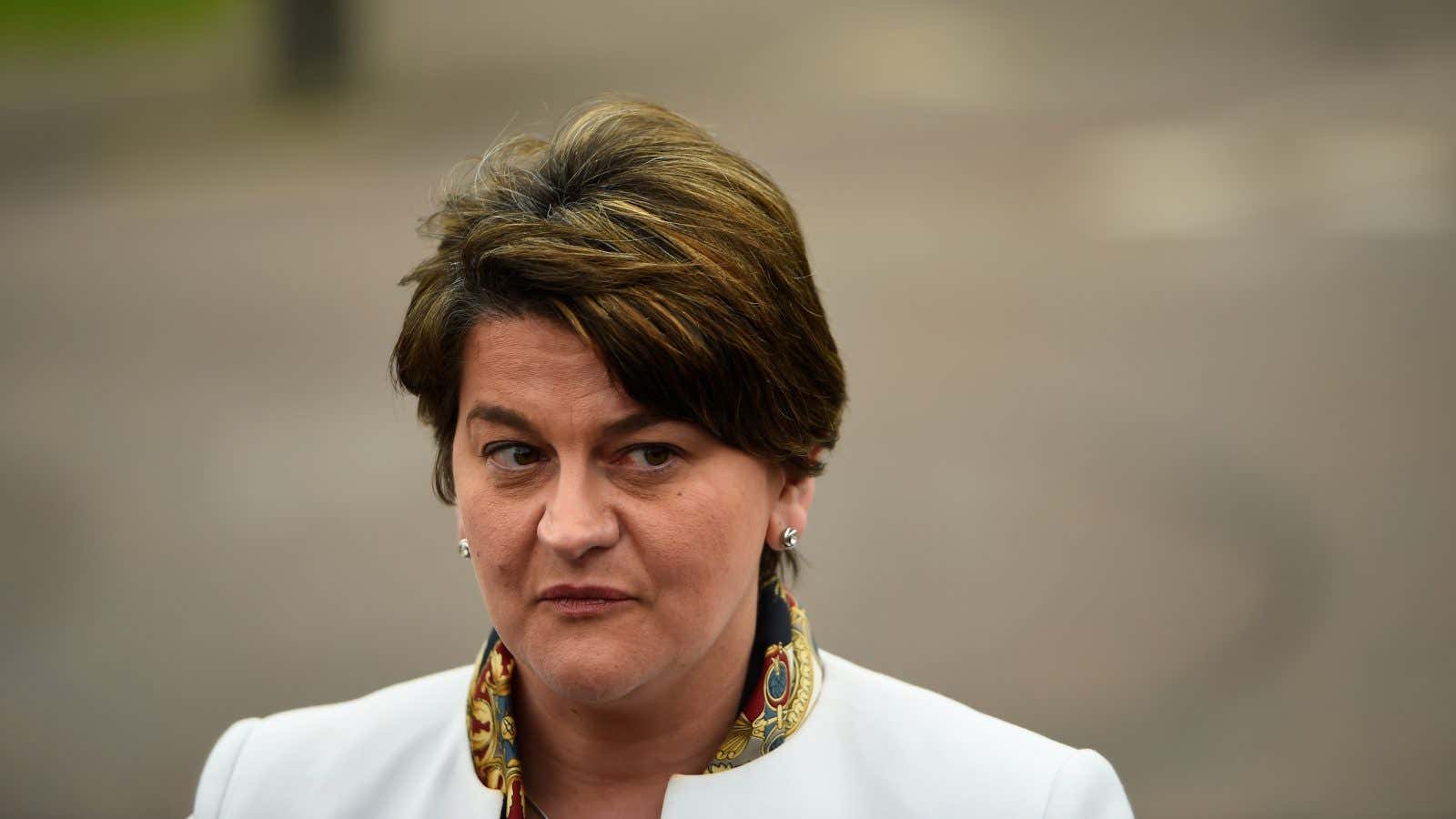Theresa May, the UK prime minister, called an election just six weeks ago, planning for her Conservative party to return with a stronger mandate for another five years in office. Instead, the government lost seats—12 and counting as the results come in—and with it the majority that ensures they can get laws passed through parliament. May’s latest plan is to form a government anyway, with support from a surprising source: The Democratic Unionist Party (DUP), a Northern Irish party that has just ten seats at Westminster.
Many are scrambling to learn what this party stands for, as evidenced by web search traffic:
So what is the DUP, and what will its sudden influence over the whole of the UK mean for the the country and its role in Europe?
What does the DUP stand for?
The DUP, led by Arlene Foster, is the biggest party in Northern Ireland, and its underlying principle is unity with the rest of the UK. That union has a long and troubled history. Throughout much of the twentieth century, violence raged in the country between those who wanted Northern Island to break away from the rest of the UK, and those who wanted to remain part of the union.
The other largest party in Northern Ireland is Sinn Féin, a republican party that refuses to sit in Westminster despite having won seven seats there.
What’s the DUP view on Brexit?
The DUP supported leaving the European Union when the UK held its referendum on the issue in June 2016. The party wanted a better deal for Northern Ireland in Europe, and when David Cameron, the then-prime minister, failed to negotiate meaningful reforms, it advocated to leave. In its 2017 manifesto, the DUP stood by that stance.
However, there are lots of reasons why the DUP might seek to soften the terms of the deal. “No one wants to see a ‘hard’ Brexit,” Foster, the DUP leader, has said, referring to the scenario in which the UK completely exits the EU, giving up access to the single market, closing its borders, and throwing out all EU laws. The DUP wants to leave, but “in a way that respects the specific circumstances of Northern Ireland, and, of course, our shared history and geography with the Republic of Ireland.”
The big issue here is the border. Northern Ireland shares a long land border with the Republic of Ireland, which is not part of the UK and is extremely pro-Europe. The manifesto called for collaboration with Europe on trade, freedom of movement across Europe, the rights of citizens living outside their native country, and a “frictionless” border with the south.
All of those views are in opposition to the increasingly ‘hard Brexit’ stance May has been taking in negotiations.
What will it mean for rights on abortion and same-sex marriage?
The UK legalized same-sex marriage in 2014, with the exception of Northern Ireland. The DUP has campaigned ferociously against it—Jim Wells, a former DUP health secretary, recently said the party would “strangle at birth” any attempt to change that. Same-sex marriage was legalized in the Republic of Ireland, a traditionally Catholic country where Northern Ireland is Protestant, in 2015.
Abortion is also legal and free to access in the UK, but not in Northern Ireland, which heavily restricts it. Abortion is also illegal in the Republic of Ireland. Every year, thousands of women from both areas travel to the UK mainland to have abortions.
In Northern Ireland, termination is only permitted if a woman’s life is at risk, or there is a permanent or serious risk to her mental or physical health, and the DUP wants to keep it that way or make it stricter. Wells, again, said in 2012 that those rules shouldn’t be used to permit rape victims to seek abortions.
Abortion has been accessible since 1967 in the UK, and isn’t the fraught battleground that it is in the US and other parts of the world. Nevertheless, the DUP’s ultraconservative views on it could strengthen a vocal anti-abortion lobby that periodically appears in the country.
How about climate change?
In 2008, the DUP appointed Sammy Wilson, a man who has referred to climate change as a “giant con,” as environment minister. He’s no longer in that post, but critics note the lack of meaningful attempts to enact climate-change legislation by the party. Northern Ireland is the only part of the UK that does not have its own legally binding targets to cut carbon emissions.
Separately, in 2012, the party successfully lobbied to have creationist theories included in descriptions at nature sites and museums—suggesting, for example, that the Giant’s Causeway geological formation is 6,000 years old, rather than around 50 million years old.
Anything else?
May isn’t proposing a formal coalition, but a looser agreement. That would mean the Conservatives still had a minority, and would rely on DUP support for every vote—which the DUP could still withhold. Without constant DUP support, Conservative initiatives could be defeated, especially if the rest of the parties—Labour, the Scottish National Party, the Liberal Democrats and some others—unite to vote against the government.
